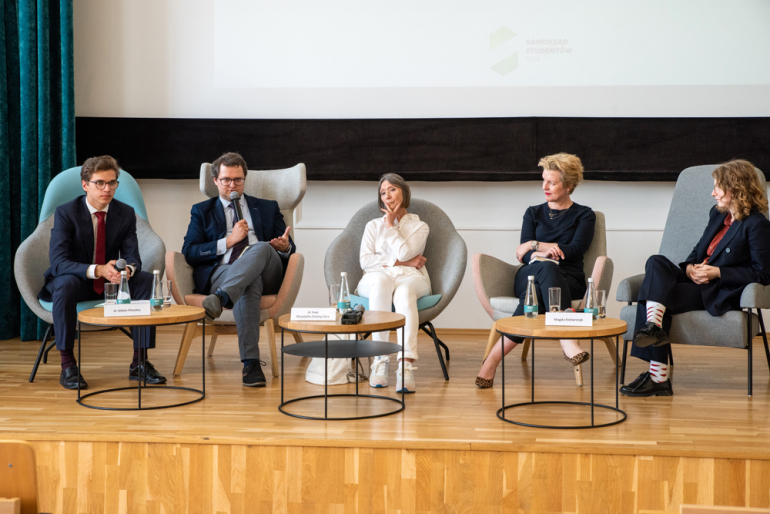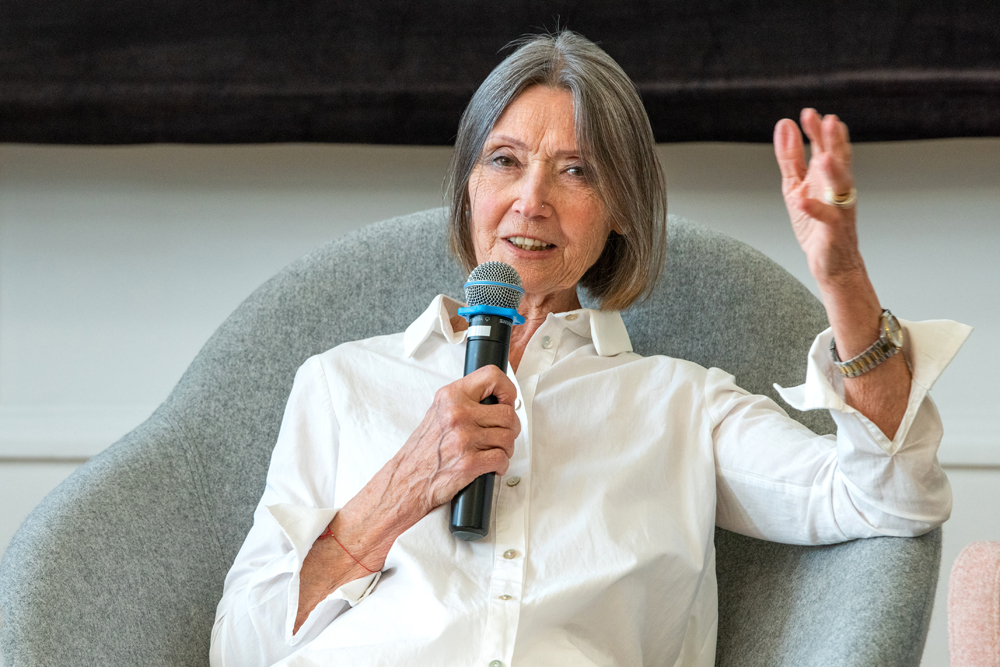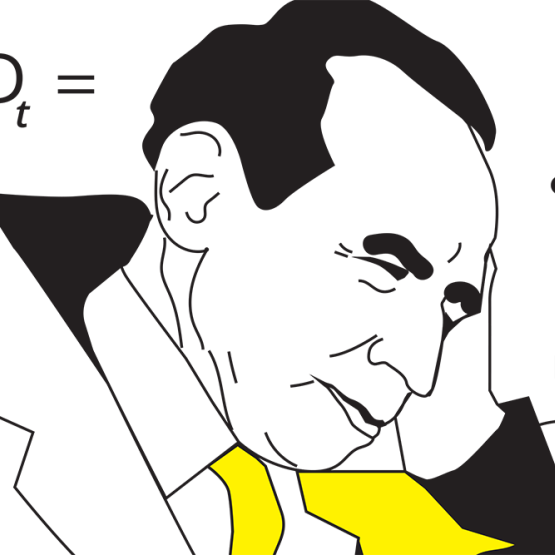
Recently, neurodiversity has become a key aspect of both the social and business context. However, understanding diversity is not always coupled with its acceptance. An acknowledged Polish psychologist and addiction therapist, Dr Ewa Woydyłło-Osiatyńska, writes that neurodiversity is much more than just a term: in a sense it is a social and moral revolution, which opens our eyes to how different and unusual we are.

Dr Ewa Woydyłło-Osiatyńska participated in the conference on Diversity Day at SGH on 23 May 2023. As a keynote speaker, she gave a lecture on “Why is it so difficult to accept the idea of neurodiversity?”
The answer is simple: because of FEAR. The atavistic fear of all things and creatures, including human beings - that are unknown, non-familiar, different from us, and most of all: DIFFERENT from what WE consider RIGHT, PROPER and NORMAL. Of course, the criteria for rejection and exclusion have been defined, “once and for all” and irrevocably, by whom? BY US, the majority. That statement reflects bitter irony because nobody is entitled to make such cruel decision to discriminate other human beings because of their “otherness”.
The roots of that fear seem atavistic today even though once, many centuries ago, they might have derived from the survival needs of the human tribes still in their primitive stage of civilization. At those early ages that fear served as the means of protection and was beneficial as an effective strategy of survival.
That strategy does not fit our today’s world because the civilized, post-industrial societies have reached such a level of life security which allows to abandon old primitive prejudices. And yet, they still haunt many individuals and groups and, not infrequently, have been stimulated by political leaders who, building up the fear in their electorate, gain their support as the saviors and benefactors guarding against the designated “enemies” (who are simply different from us).
Let us say now a few words about NEURODIVERSITY, an aspect of diversity which has in recent years developed into an important concept studied and discussed by a growing number of professionals as well as general public. The concept of neurodiversity was first formulated some 20 years ago by an Australian sociologist Judy Singer. She realized that we are all diversified in terms of neurological make-up of our brains. In other words, natural diversification of human brains affects the way of how we feel, think, experience such stimuli as smell, sound, taste, touch or light. In that multitude of sensual experiences, nobody feels RIGHT, and nobody feels WRONG.
Each of us, and we all, feel as we simply DO.
Not only does the very concept of neurodiversity seem new, but also the controversies it initiated. However, the concept of neurodiversity tends to protect human rights of all individuals to be who everybody simply feels to be.
What is revolutionary in this context is the decision to abandon discriminative attitude toward such qualities as high sensitivity, difficulties with social exposition, deficits in all kinds of self-expression and various differences in perception of common stimuli like sound, light, touch, smell or taste.
Up to now the medical negative diagnoses have been applied to emphasize the abnormality of those responses. We now propose to broaden the scale to include the differences. One of the goals is to abandon the old division into NORMAL vs. ABNORMAL and change it so all people feel equally normal, but individually unique. I personally propose the division of us all into a category of majority which is AVERAGE vs. a category of various minorities which is NON-AVERAGE.
If we ponder the issue with empathy, we must realize that while the neurodiverse persons do not, in fact, meet the criteria of a “standard” human being; nevertheless, they belong to the same kind and genre to which belongs the entire humanity. The vocabulary of emphasizing differences justifies discrimination. Semantically, NORMAL means “proper”, “such as it SHOULD BE. Accepted. One of the arguments behind such diversification is based on the psychiatric understanding of mental health where such diagnoses as AUTISM, Attention Deficit Disorder, Dyspraxia, Dyslexia or Asperger Syndrome have been considered “out of the healthy norm and attributed to the mentally disturbed anomaly”. That approach has justified discrimination, deprivation, stigmatization and social ostracism.
With the progressive developments of research concerning the functions of human brain, we have learned that most psychiatric diagnoses should not disqualify the neurodiverse people from any of human activities even though they may need special consideration for their uniqueness in responses or ways of expressing themselves. Very often, neurodiverse individuals may enormously contribute to economy, education, art, IT, or other fields of human activities in the contemporary world.
Instead of isolating the “different” individuals, we propose to focus on their unique potential and strengths. Studies show that up to 20 percent of the general population meet the criteria for ATYPICALITY. This group of people can differ significantly in their thinking, feeling and behavior from the majority of the typical (or average) population. And that is their strength rather than weakness. In the society where human relations are based on the old prejudice and discriminative criteria of normal vs. abnormal, every fifth person meets scorn, maltreatment or flat expulsion. They are told “they don’t fit”. They are sent to special ed programs or recommended for social care as “defective” individuals, unable to contribute to the common good of the society.
In this context, neurodiversity is first and foremost a permission to be yourself and to find meaning in your own individuality. It is a permission not to be afraid to speak in one’s own voice, especially when the subject concerns you personally.
Please also note that it would be a great mistake if the emphasis were applied only to the feelings, wellbeing or quality of life of the a-typical individuals. The society, all societies in the contemporary world, would have remained deprived of the enormous potential of their unique mentality and talents. It is not accidental that it is the highly demanding businesses and research branches that have become the first to open up to embrace the a-typical employees. Thanks to the unique abilities of the a-typical mathematicians, inventors, engineers and creative employees, many technological branches have catapulted in inventiveness and ingenuity.
So, if not for the noble purpose of “loving thy neighbor as thyself”, we may choose acceptance of neurodiversity for the good reasons of improving our economy and common wellbeing thanks to the contribution of our a-typical fellow-humans.
Neurodiversity Day is an event referring to the Diversity Charter, signed by the SGH Warsaw School of Economics in 2020. This student-driven initiative promotes diversity and equal opportunities for all, regardless of origin, religion, world view, skin colour, gender identity or disability.
Let me take this opportunity to mention the post-graduate School of Neurodiversity in the Workplace: Inclusive Recruitment and Management inaugurated last October at the SWPS University in Warsaw. It is worth mentioning especially because it is the first such academic and research program in Europe. The studies aim to educate employers and employees in how to include the a-typical persons in their teams. In other words, it is about the adaptation of the workplaces to accommodate a-typical persons’ needs and utilize their unique competencies such as focus on detail, creativity, spatial imagination, outstanding performance and perseverance. It is all about understanding the value of unique people as highly competent employees in industries such as Information Technology, finance and design, including graphic design. While the project is just the first attempt to introduce the heraldic concept of Neurodiversity in Academia, it has become a forerunner of that innovative idea, gradually being widespread among the larger population in Poland.
As a clinical psychologist and practicing psychotherapist of several decades, I would like to note that my professional and personal involvement in promotion of Neurodiversity Culture is a response to observations of frequent incidents of discrimination and prejudice against children and adults from behavioral or intellectual minorities. That is an unfortunate result of the old tradition of cultural backwardness and scarce public education in equality and human rights. I hope the first studies at the university level as well as this neurodiversity conference will eventually prevail and the human potential of all people will be equally appreciated and included both in the social and economic spheres of our life.
Let me quote here Hiren C. Shukle, the founder and leader of American and Global Neuro-
-Diverse Centers of Excellence. He has many years of experience in planning and implementing business transformation strategies, with a particular focus on talent management. He says: “When we think about solving all the problems looming over our tomorrow, we discover that old ways do not fit. We definitely need new ways of thinking. First of all, we need to include everyone in that process, not leaving out anybody. Especially those who have a great unique potential.”
In fact, it is about a huge paradigm shift - the idea that neurodivergent people would be welcomed to organizations because of what they can bring. Instead of feeling sorry for them, we should step aside and make room for their full participation in our struggle to achieve a common good for everybody.
You may look at the shift in terms of promotion of human rights, but you also may see an incredible benefit from the point of view of their unique contribution to the economic gains and developments. Did you know that up to 30 percent of employees of the economically successful sectors of Digital Transformation, Artificial Intelligence and Space Inventions are people who not so long ago would wind up jobless and socially rejected, with the diagnoses of Asperger, Autism or other neurodiverse disorders, put under the psychiatric care?
Steve Silberman, an award-winning popular science writer, is one of the leading authors explaining the concept of neurodiversity. His book “Neurotribes” (published also in Poland as “Neuroplemiona”), has been translated into 25 languages. With his writing and teaching he challenges traditional obstacles to accept and emphasize the potential of all human beings regardless of hindrances resulting from their neurological differences.
Silberman says: “Imagine if society had put off the issue of civil rights until the genetics of race were sorted out, or denied wheelchair users access to public buildings while insisting that someday with the help of science, everyone will be able to walk. . . .“
From the point of view of a psychotherapist, the important thing about people is not what is their hindrance or deficit but the contrary - what are their strengths, talents, potentials and values. In psychology and philosophy of learning such approach is called “positive reinforcement”. It means that we all learn faster and perform better when we feel good. So simple. And this applies to all and in all circumstances. But if we apply this approach to neuro-atypical persons, positive reinforcement takes up a special meaning: instead of scorn or suspicion, we offer hope, acceptance and support. So, how do you think those people will feel? And how different their feelings will be from what many of them have experienced until now? Together we may create a future in which everyone is given the best chance of success, and creative and engaged life.
In closing, I’d like to bring up the concept of dignity. Human dignity. Understanding and accepting neurodiversity is a means of protecting dignity of every person against exclusion or rejection. It is about treating us all as unique, and still acceptable human beings.



